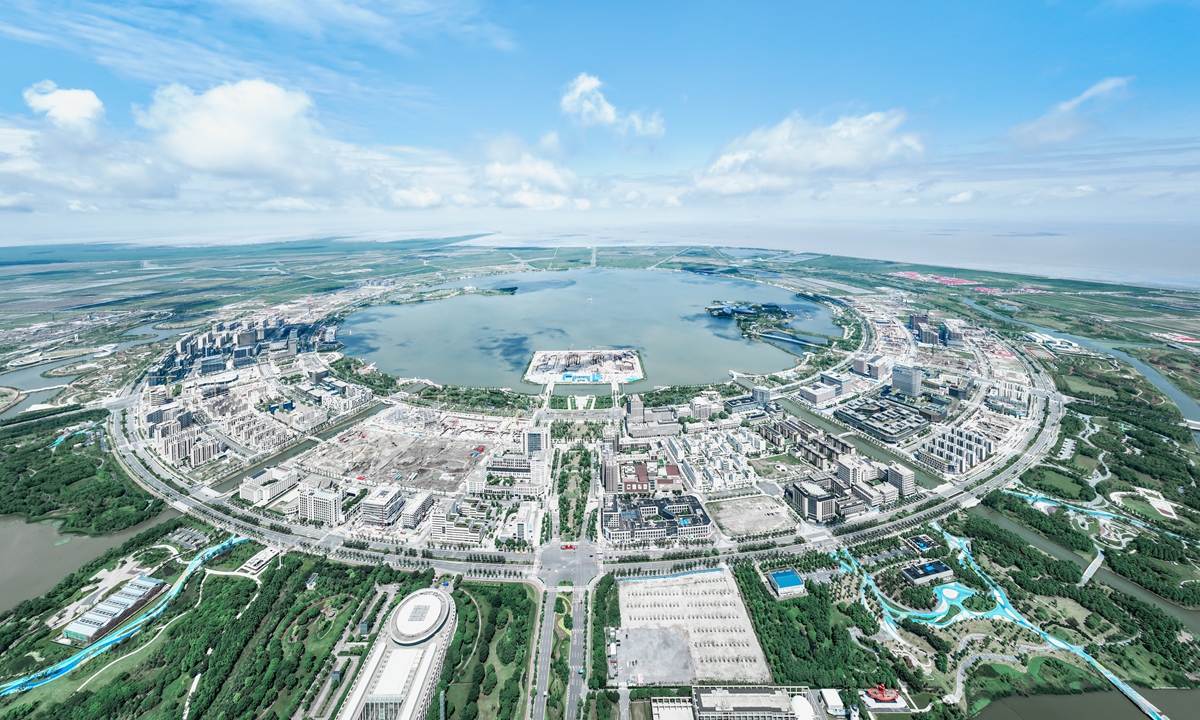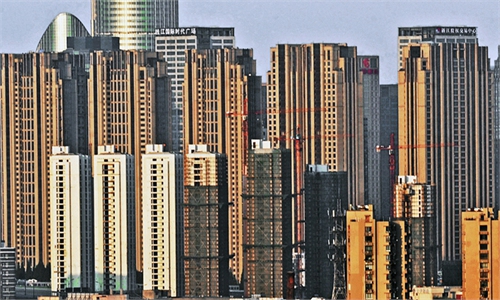Shanghai FTZ at forefront of high-level opening-up
Lingang new area's GDP soars, with impressive 21.2% annual growth over four years

Lingang New Area of Shanghai Free Trade Zone Photo: VCG
The new area of the China (Shanghai) Pilot Free Trade Zone (FTZ) is a frontier of China's reform and opening-up. Since its establishment in 2019, the speed, efficiency and innovation in Lingang have become a testament to China's high-level opening-up with an impressive annual growth rate of over 20 percent.
Lenze, a German automation and intelligent manufacturing company, was one of the first foreign-funded enterprises to settle in Lingang.
"In the past four years, our business in China has more than doubled. Each year, we have seen our business grow 20 percent to 30 percent, and we have gradually achieved true localization, from research and development to the supply chain," Xie Weidong, president for East Asia and general manager for China, Lenze Group told the Global Times.
"Some products take several years to develop in Germany, with high costs and long delivery times, but we can produce them in China in just over a year," Xie said.
The growth is also reflected in new car delivery rates from Tesla's Shanghai Gigafactory, which has become Tesla's most efficient factory worldwide.
The facility, a flagship project in the Lingang new area, has constantly set new industry records and produced more than 2 million vehicles within less than four years, the Global Times learned from Tesla.
It took 33 months to achieve the first "million vehicles" milestone and only 13 months to accomplish the second "million vehicles" milestone.
The traditional vehicle manufacturing process usually requires thousands of employees to collaborate in order to complete various tasks on a production line. With a highly automated production line as its backbone, Tesla's Shanghai Gigafactory only requires dozens of employees to complete manufacturing tasks on the same scale.
"The efficient operation of Tesla's Shanghai Gigafactory is greatly supported by the high-quality and open business environment in the Lingang new area of the Shanghai FTZ," said Tao Lin, vice president of Tesla.
In the past four years, the GDP of the Lingang new area has grown at an average annual rate of 21.2 percent. The industrial output value of large-scale industries has increased by an average of 37.8 percent per year, while fixed-asset investment has grown by an average of 39.9 percent and total trade has grown by an average of 44 percent, according to official data.
Behind the rapid growth is the fact that Lingang has played a pioneering and experimental role in promoting China's high-level opening-up with a fast response and innovative spirit.
In the four years since its establishment, the Lingang new area has accumulated 102 typical cases of institutional innovation, including 48 pioneering cases nationwide. Many of these cases are the first of their kind and have set precedents for the entire country.
"Lingang has many policies that encourage innovation, especially in terms of tax deductions for research and development. Recently, we invested in an advanced motor production line, and enjoyed the benefits of tax deductions within a few months. This incentive will encourage us to reinvest in innovation," Xie said.
The Lingang new area is rapidly advancing the establishment of an industrial development paradigm, characterized by technological innovation as its inherent driving force, advanced manufacturing as a pivotal support, and the modern services industry as a distinctive advantage.
The effort comes as China continues to deepen reforms and expand high-level opening-up, creating greater opportunities for global businesses where new technologies, the digital economy and green development are highlighted.
"This year we're introducing a number of new products that really highlight our commitment and our product mix in circularity, plastic circularity in particular, high efficiency, safer environmental materials, and new energy is a big focus," Kevin Kolevar, global vice president of public policy and government affairs of Dow, a materials science company registered in the Shanghai FTZ, told the Global Times.
"This really fits with the kind of trends that we see in China now and we see a very bright future going forward in China," Kolevar said. Dow is in the third year of a $300 million expansion at its plant in Zhangjiagang, East China's Jiangsu Province.
Marking the 10th anniversary of the establishment of the Shanghai FTZ, the State Council, China's cabinet, recently issued a general plan for advancing the institutional opening-up of China (Shanghai) Pilot Free Trade Zone (FTZ) in alignment with high-standard international economic and trade rules, serving as another positive message demonstrating China's commitment in opening-up.
The plan involves deepening reforms in key areas such as domestic and foreign trade, finance and technology in advancing high-level institutional opening-up.
Xie from Lenze said that the group has identified China as a crucial development region and growth engine in a plan for 2030, buoyed by the country's commitment to continued opening-up and pushing for advanced manufacturing.
"In recent years, China's business environment policies have been favorable, emphasizing openness and innovation, making it an ideal investment destination. China is also moving from a world factory to a manufacturing powerhouse and we are very confident that there is unlimited growth potential in China," Xie said.

